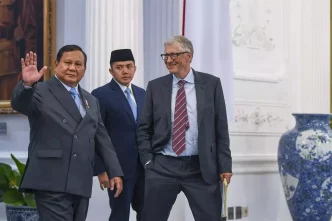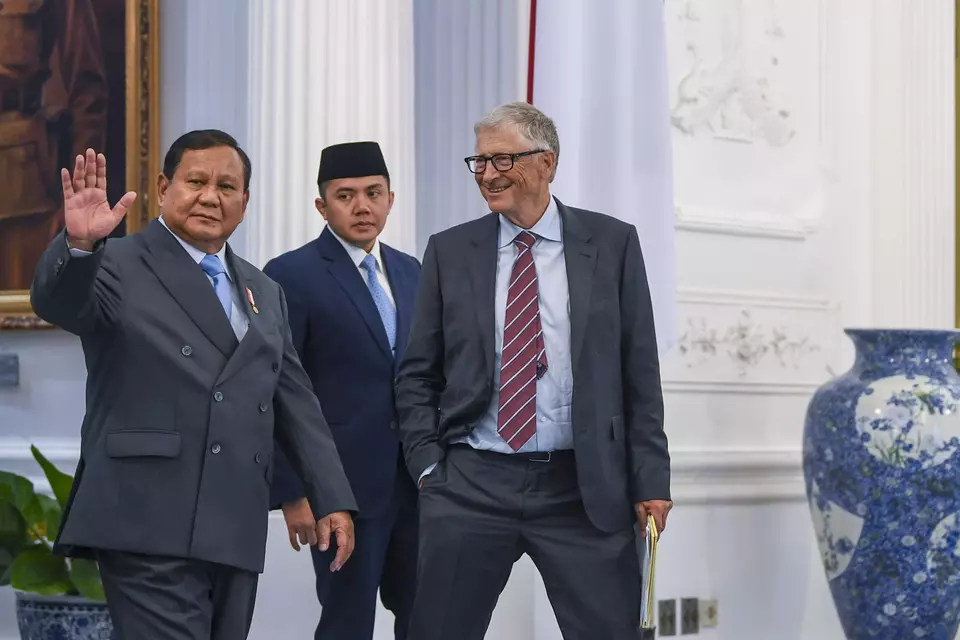Microsoft cofounder and philanthropist Bill Gates has been offered a significant advisory role in Indonesia’s newly established sovereign wealth fund, Danantara, during a high-profile meeting with President Prabowo Subianto at the State Palace in Jakarta on Wednesday. The meeting, which also saw discussions on strategic collaborations with Danantara Trust—the fund’s philanthropic arm—marks a pivotal moment in Indonesia’s efforts to bolster its economic and charitable initiatives with global expertise.
A Strategic Partnership with Global Implications
The offer to Gates, who chairs the Gates Foundation, one of the world’s largest private charitable organizations, comes as Indonesia seeks to position Danantara as a trusted entity for both economic investment and philanthropy. During the meeting, Health Minister Budi Gunadi Sadikin expressed hope that Gates would join the fund’s advisory board alongside other prominent figures like hedge fund titan Ray Dalio. “I wish Pak Bill could sit on the board together with your friend Pak Ray Dalio, as both of you are already on the Chinese philanthropy board” said Budi, referencing the China Global Philanthropy Institute, a charity-focused initiative co-founded by Gates and Dalio.
Danantara, which unveiled its advisory board in March, already includes notable names such as economist Jeffrey Sachs, former Thai Prime Minister Thaksin Shinawatra, and former Credit Suisse CEO Helman Sitohang. The inclusion of Gates could further elevate the fund’s international credibility, signaling Indonesia’s ambition to integrate global financial and philanthropic expertise into its development strategy. Budi highlighted the untapped potential of philanthropy in Indonesia, noting that if giving matched 2 percent of GDP—as seen in some developed countries—the country could see up to US$30 billion annually in contributions.
However, challenges remain. Budi pointed out that a lack of trusted local entities has historically driven much of Indonesian philanthropy overseas. The establishment of Danantara Trust, inspired by models like Singapore’s Temasek Foundation, aims to address this gap by creating a dedicated arm for managing endowments and channeling charitable grants. “We have a systematic management approach that can help us earn the trust of these local philanthropists to provide grants” said Budi during the discussions.
Danantara Trust: A Philanthropic Vision Takes Shape
Danantara Trust, set to launch with an initial capital of US$100 million this year, has ambitious plans to grow to US$1 billion within six years. According to Danantara CEO Rosan Roeslani, the government intends to allocate between 1 and 2.5 percent of annual dividends from state-owned enterprises (SOEs) to the trust. Its focus will span critical areas such as education and healthcare, with additional efforts to align SOEs’ corporate social responsibility programs with national initiatives.
The Gates Foundation, with an endowment of approximately US$75 billion as of 2023, has already proposed providing grants and collaborating with Danantara Trust. While financial details remain undisclosed, Rosan confirmed that discussions with the foundation’s representatives, including deputy director Pippa Zainoeddin and Southeast Asia representative Jamal Khan, have led to an agreement in principle. “The government has agreed, and we’re now finalizing details” said Rosan, underscoring the potential for a transformative partnership.
Indonesia has been a long-term partner for the Gates Foundation, which has donated over US$159 million to the country since 2009, primarily in healthcare initiatives such as vaccine funding. Speaking at the State Palace, Gates emphasized the power of philanthropy to influence systemic change. “Indonesia is one of the countries where we’ve had a long-term partnership” he said. “Philanthropy can be a powerful force. If it works well, governments can eventually change how they approach health and education.”
Health and Technology: Gates’ Vision for Indonesia
Beyond financial collaborations, Gates outlined several upcoming health initiatives during the meeting, reflecting his foundation’s commitment to addressing Indonesia’s pressing challenges. The country ranks second globally for tuberculosis cases, with one death occurring every five minutes due to the disease. Gates announced plans for a tuberculosis vaccine trial, alongside programs for micronutrient supplementation and anemia treatment, set to roll out over the next one to two years.
Gates also highlighted the transformative potential of artificial intelligence (AI) in sectors like health, education, and agriculture. He expressed optimism about AI’s capacity to develop new tools and solutions, which could play a crucial role in addressing systemic issues in developing economies like Indonesia. While specific details on AI-related projects were not disclosed, his remarks suggest a forward-looking approach to integrating technology into philanthropy and development.
Additionally, Gates has deepened ties with local partners, including the Tanoto Foundation, established by Indonesian businessman Sukanto Tanoto. The two organizations signed a new memorandum of understanding on Tuesday to expand their regional efforts across Asia, further cementing Gates’ commitment to collaborative impact in the region.
Recognizing Contributions and Observing Initiatives
In a gesture of appreciation for Gates’ long-standing contributions to Indonesia, President Prabowo announced his intention to award the philanthropist the country’s highest civilian honor at the upcoming United Nations General Assembly summit in New York this September. The recognition underscores the significance of Gates’ involvement in Southeast Asia’s largest economy, both through direct funding and strategic partnerships.
Following their discussions at the State Palace, Gates and Prabowo visited an elementary school in Jakarta to observe students participating in the free nutritious meal program, a flagship initiative of the President’s administration. Announced well before Prabowo’s election victory in February of the previous year, the program aims to serve 82.9 million recipients—over a quarter of Indonesia’s population—by the end of 2025. National Nutrition Agency head Dadan Hindayana noted that Gates was impressed by the program’s scale and ambition. “He appreciated it, to which Prabowo replied that the funds had been prepared by the Indonesian government” said Dadan, reflecting the administration’s commitment to its social welfare goals.
Economic and Political Dimensions of Danantara
The establishment of Danantara and its associated trust represents a broader economic strategy under Prabowo’s leadership to harness both domestic and international resources for national development. Sovereign wealth funds like Danantara are typically designed to manage state assets and invest in long-term growth, often focusing on infrastructure, technology, and other strategic sectors. By integrating a philanthropic arm, Indonesia is adopting a hybrid model that seeks to address immediate social needs while building economic resilience.
The involvement of high-profile international figures like Gates and Dalio could also serve as a signal to global investors of Indonesia’s openness to collaboration and reform. However, the success of Danantara Trust will likely depend on its ability to establish transparency and accountability—key factors in overcoming the historical distrust that has pushed local philanthropy abroad. If managed effectively, the trust could become a cornerstone of Indonesia’s social development framework, complementing government efforts in critical areas like education and healthcare.
Politically, Prabowo’s engagement with Gates and his administration’s focus on initiatives like the free meal program reflect a dual emphasis on international partnerships and domestic priorities. The President’s commitment to social welfare programs, coupled with strategic economic vehicles like Danantara, suggests an effort to balance populist policies with long-term financial planning. Whether this approach will yield sustainable results remains an open question, particularly given the ambitious targets set for both the trust’s growth and the meal program’s rollout.
Looking Ahead: Challenges and Opportunities
As Indonesia moves forward with Danantara and its associated initiatives, the collaboration with figures like Bill Gates offers both opportunities and challenges. On one hand, the Gates Foundation’s expertise and resources could provide a significant boost to the country’s health and education sectors, while lending credibility to Danantara Trust’s mission. On the other hand, ensuring that such partnerships align with local needs and priorities will be critical to avoiding perceptions of external influence over national policies.
Moreover, the scale of programs like the free nutritious meal initiative highlights the immense logistical and financial demands on the government. While Gates’ appreciation for the program is a positive endorsement, sustained funding and effective implementation will be essential to meeting the needs of over 80 million recipients. As these efforts unfold, the interplay between philanthropy, technology, and governance in Indonesia will likely shape the trajectory of Prabowo’s administration and the country’s development goals.
For now, the meeting between Gates and Prabowo signals a new chapter in Indonesia’s engagement with global philanthropy and economic strategy. As partnerships deepen and initiatives take shape, the question remains how these ambitious plans will translate into tangible benefits for Indonesia’s population and economy.















